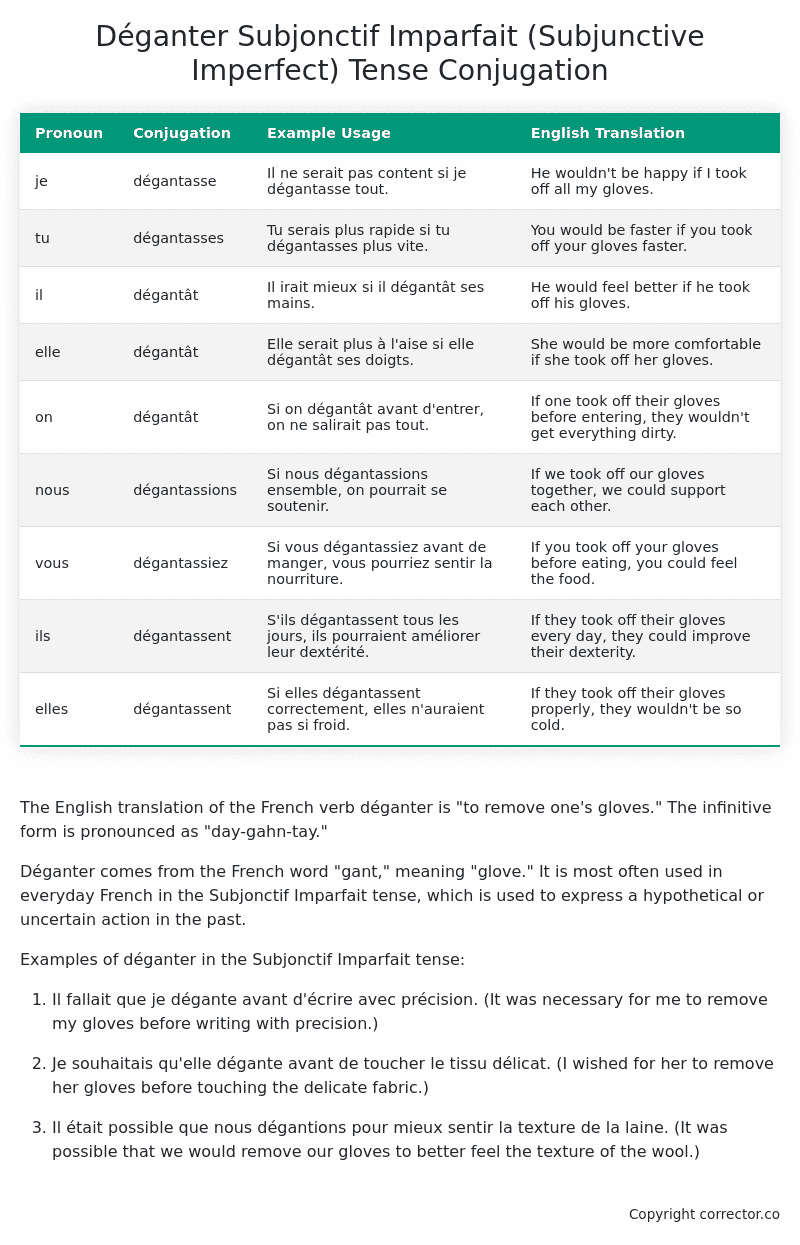Subjonctif Imparfait (Subjunctive Imperfect) Tense Conjugation of the French Verb déganter
Introduction to the verb déganter
The English translation of the French verb déganter is “to remove one’s gloves.” The infinitive form is pronounced as “day-gahn-tay.”
Déganter comes from the French word “gant,” meaning “glove.” It is most often used in everyday French in the Subjonctif Imparfait tense, which is used to express a hypothetical or uncertain action in the past.
Examples of déganter in the Subjonctif Imparfait tense:
-
Il fallait que je dégante avant d’écrire avec précision. (It was necessary for me to remove my gloves before writing with precision.)
-
Je souhaitais qu’elle dégante avant de toucher le tissu délicat. (I wished for her to remove her gloves before touching the delicate fabric.)
-
Il était possible que nous dégantions pour mieux sentir la texture de la laine. (It was possible that we would remove our gloves to better feel the texture of the wool.)
Table of the Subjonctif Imparfait (Subjunctive Imperfect) Tense Conjugation of déganter
| Pronoun | Conjugation | Example Usage | English Translation |
|---|---|---|---|
| je | dégantasse | Il ne serait pas content si je dégantasse tout. | He wouldn’t be happy if I took off all my gloves. |
| tu | dégantasses | Tu serais plus rapide si tu dégantasses plus vite. | You would be faster if you took off your gloves faster. |
| il | dégantât | Il irait mieux si il dégantât ses mains. | He would feel better if he took off his gloves. |
| elle | dégantât | Elle serait plus à l’aise si elle dégantât ses doigts. | She would be more comfortable if she took off her gloves. |
| on | dégantât | Si on dégantât avant d’entrer, on ne salirait pas tout. | If one took off their gloves before entering, they wouldn’t get everything dirty. |
| nous | dégantassions | Si nous dégantassions ensemble, on pourrait se soutenir. | If we took off our gloves together, we could support each other. |
| vous | dégantassiez | Si vous dégantassiez avant de manger, vous pourriez sentir la nourriture. | If you took off your gloves before eating, you could feel the food. |
| ils | dégantassent | S’ils dégantassent tous les jours, ils pourraient améliorer leur dextérité. | If they took off their gloves every day, they could improve their dexterity. |
| elles | dégantassent | Si elles dégantassent correctement, elles n’auraient pas si froid. | If they took off their gloves properly, they wouldn’t be so cold. |
Other Conjugations for Déganter.
Le Present (Present Tense) Conjugation of the French Verb déganter
Imparfait (Imperfect) Tense Conjugation of the French Verb déganter
Passé Simple (Simple Past) Tense Conjugation of the French Verb déganter
Passé Composé (Present Perfect) Tense Conjugation of the French Verb déganter
Futur Simple (Simple Future) Tense Conjugation of the French Verb déganter
Futur Proche (Near Future) Tense Conjugation of the French Verb déganter
Plus-que-parfait (Pluperfect) Tense Conjugation of the French Verb déganter
Passé Antérieur (Past Anterior) Tense Conjugation of the French Verb déganter
Futur Antérieur (Future Anterior) Tense Conjugation of the French Verb déganter
Subjonctif Présent (Subjunctive Present) Tense Conjugation of the French Verb déganter
Subjonctif Passé (Subjunctive Past) Tense Conjugation of the French Verb déganter
Subjonctif Imparfait (Subjunctive Imperfect) Tense Conjugation of the French Verb déganter (this article)
Subjonctif Plus-que-parfait (Subjunctive Pluperfect) Tense Conjugation of the French Verb déganter
Conditionnel Présent (Conditional Present) Tense Conjugation of the French Verb déganter
Conditionnel Passé (Conditional Past) Tense Conjugation of the French Verb déganter
L’impératif Présent (Imperative Present) Tense Conjugation of the French Verb déganter
L’infinitif Présent (Infinitive Present) Tense Conjugation of the French Verb déganter
Struggling with French verbs or the language in general? Why not use our free French Grammar Checker – no registration required!
Get a FREE Download Study Sheet of this Conjugation 🔥
Simply right click the image below, click “save image” and get your free reference for the déganter Subjonctif Imparfait tense conjugation!

Déganter – About the French Subjonctif Imparfait (Subjunctive Imperfect) Tense
Formation
Common Everyday Usage Patterns
Interactions with Other Tenses
Subjonctif Présent
Indicatif Passé Composé
Conditional
Conditional Perfect
Summary
I hope you enjoyed this article on the verb déganter. Still in a learning mood? Check out another TOTALLY random French verb conjugation!


